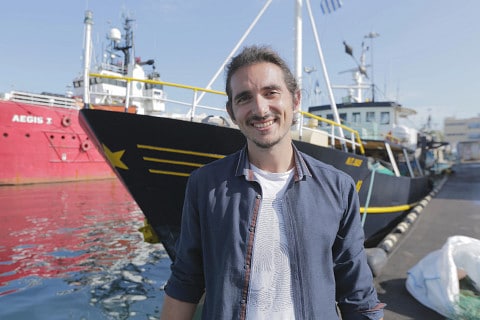15 December was a great day for Lefteris Arapakis, not only because he was named by the United Nations Environment Programme (UNEP) as a “Young Champion of the Earth“, but also because the award was announced on his “name day” which is a very important day for Greeks. What a happy coincidence!
Lefteris, 26, is one of seven young scientists, engineers, entrepreneurs and activists from across the globe named by UNEP as its 2020 Young Champions of the Earth. With solutions to harvest water from the air, recycle plastic into paving slabs, and motivate fishers to haul tonnes of plastic out of the ocean, these changemakers show how innovative ideas coupled with ambitious action can help solve some of the world’s most pressing environmental challenges.
Lefteris comes from a long line of fishers of Piraeus. For five generations, his family has plied the bountiful waters off southern Greece, netting the same cod and red mulls that have sustained Greeks for millennia. But in recent years, overfishing and pollution, especially discarded plastic, have hammered Greece’s fisheries, with catches in the Mediterranean Sea falling by as much as 34 per cent in the last 50 years. Out at sea, he noticed many boats around his hometown of Piraeus hauling in nets filled with rubbish, instead of fish.
This plastic by-catch was then simply dumped back into the water. “I got more and more worried about the scarcity of fish and the increase of plastic,” said the young Greek. “I was deeply concerned that my father, and now my brothers, could not make a living out of this job, which is what they learned to do and what they love to do.”
The revelation led Lefteris to found Greece’s first professional fishing school, Enaleia (Greek for ‘together with the fishers’). in 2016. Its mandate would be twofold: teach fishers to ply their trade in a more eco-friendly manner and enlist the help of the seafaring community to scour the Mediterranean for discarded plastic.
Since its launch, Enaleia and its branch, Mediterranean Cleanup, have collected more than 80 tonnes of plastic from the sea. “We teach students not just how to fish, but also how to fish so fish can exist tomorrow,” said Lefteris.
With this initiative fishers remove around 20 tonnes of plastic from the sea each month. Initially Lefteris and his team stored the plastic at recycling facilities at the port, but the increasing volumes motivated them to create an innovative partnership with Healthy Seas, an organization based in the Netherlands that upcycles fishing nets (the most common “catch”) into carpets, socks, masks and other consumer products.
Enaleia now works with 700 fishers and operates in 12 Greek ports as well as Rimini in Italy.
Lefteris, who has a degree in economics and management from the Athens University of Economics and Business, says the plastic pollution in the fishing areas of the Argosaronikos gulf “has been significantly reduced”.
“The fishers are saving the seas from plastic,” he added. The spread of COVID-19 dealt a temporary blow to Enaleia earlier this year. During the first lockdown in Greece in March and April, many of their sponsorship contracts were cancelled. However, Enaleia adapted to the pandemic and managed to increase the plastic collected from the sea. Once the pandemic passes, Lefteris plans to expand Enaleia’s work to other seafaring countries.
“We want to empower every fisher to catch plastic and then bring it back to the port and upcycle it. That would create a huge global impact.” While the tide of marine plastic continues to grow, Lefteris is optimistic about the future. “I think there is a lot of awareness from our generation about plastic pollution and other environmental challenges. Awareness that I don’t think has existed on such a wide scale for decades.”




